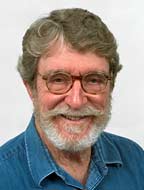 Henry Blackburn earned his M.D. from Tulane University in 1948, the M.S. from the University of Minnesota in 1957, and became a medical fellow in the Department of Medicine in 1953. In 1956, he became a faculty member in the Laboratory of Physiological Hygiene in the School of Public Health, where he worked with Ancel Keys. Upon the retirement of Dr. Keys in 1972, Dr. Blackburn was appointed director of the Laboratory, a position he held until its merger with the Division of Epidemiology in 1983. He then became head of the new Division of Epidemiology and Community Health, a position he held until 1990.
Henry Blackburn earned his M.D. from Tulane University in 1948, the M.S. from the University of Minnesota in 1957, and became a medical fellow in the Department of Medicine in 1953. In 1956, he became a faculty member in the Laboratory of Physiological Hygiene in the School of Public Health, where he worked with Ancel Keys. Upon the retirement of Dr. Keys in 1972, Dr. Blackburn was appointed director of the Laboratory, a position he held until its merger with the Division of Epidemiology in 1983. He then became head of the new Division of Epidemiology and Community Health, a position he held until 1990.
Interview Abstract
Henry Blackburn begins by describing his background, including his education, his experiences in the Navy, and his decision to pursue a career in medicine. He discusses coming to the University of Minnesota and his experiences as a Fellow in the Department of Medicine in the 1950s. He discusses the Laboratory of Physiological Hygiene (LPH), including collaboration between Cardiology and the LPH; the School of Public Health (SPH) and the distance between the SPH and the LPH; the retirement of Ancel Keys and the status of the LPH; space issues for the LPH; the teaching responsibilities of the LPH faculty; the growth of the LPH in the 1970s; the merger of the LPH and the Division of Epidemiology; and his research projects in the 1960s, including the Seven Countries Study. He describes attitudes toward public health and epidemiology in the mid-twentieth century; relationships between divisions in the SPH; the status of public health in the College of Medical Sciences; and relations between the University of Minnesota Medical School and the local medical community. He discusses federal funding, particularly the funding epidemiology studies; tensions between medicine and public health; concern in the 1960s over a shortage in health manpower; the Medical School curriculum revisions in the 1960s and early 1970s; the nurse practitioner program and public health nursing; the reorganization of the health sciences in 1970; the Division of Epidemiology; the recruitment of minority students; women faculty; changes in public health during his career; and the growing emphasis on personalized medicine. He talks about Albert Sullivan, CJ Watson, Ancel Keys, Maurice Visscher, Gaylord Anderson, Robert Howard, Lyle French, Lee Stauffer, Robert Kane, and Edith Leyasmeyer.
Biographical Sketch
Henry Blackburn was born in Florida in 1925. He volunteered for the Navy after high school. He received his BS from the University of Miami in 1947, his MD from Tulane University in 1948, and his MS from the University of Minnesota in 1957. He worked as a staff physician at the Methodist Clinics in Cuba in the summer of 1949. He did his residency at the American Hospital of Paris (1949-1950). He then served as the Medical Officer in Charge in the US Public Health Service, Foreign Quartine, in Salzburg, Vienna, and Munich. In 1953, he came to the University of Minnesota as a medical fellow in the Department of Medicine (1953-56). In 1956, he was Chief Resident of Internal Medicine at Ancker Hospital in St. Paul. He then joined the Laboratory of Physiological Hygiene, first as a research fellow (1956-1958), then Assistant Professor (1958-1961), Associate Professor (1961-68), and Professor (1968-present). He was also a Professor in the Department of Medicine (1972-present). He became the director of the Laboratory of Physiological Hygiene in 1972 on the retirement of Ancel Keys and remained director until the merger of Epidemiology in 1983, which he then headed until 1990. He retired in 1996 and remains in the School of Public Health as Professor Emeritus in the Division of Epidemiology and Community Health.
Interview Transcript
HBlackburn.pdf